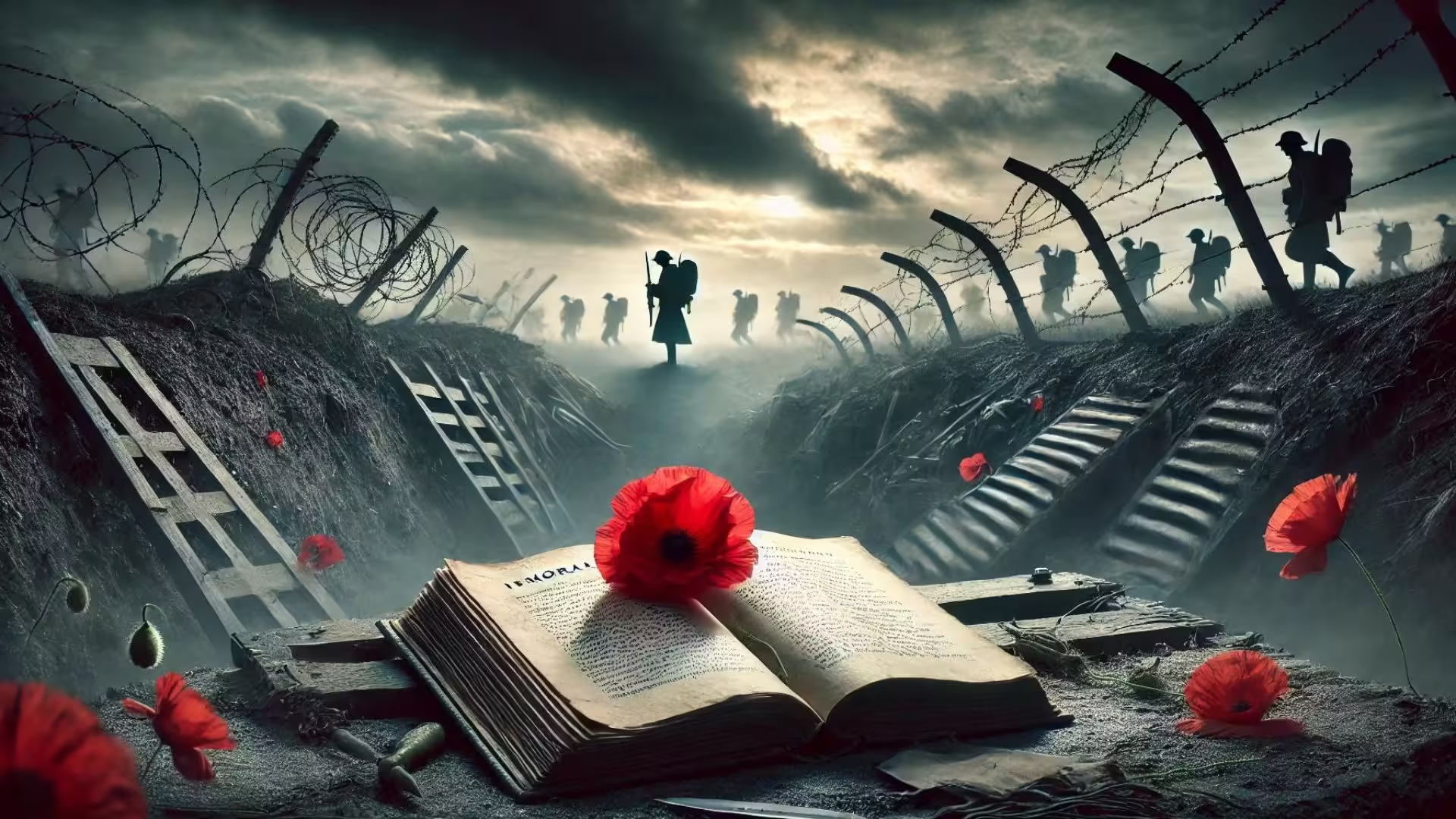War has been a recurring theme in literature, often evoking profound emotions and deep reflections on the human condition. Poetry, with its capacity to distill complex emotions into powerful imagery and language, serves as a poignant medium for expressing the horrors, heroism, and futility of war. Immortal poems about war continue to resonate across generations, offering insights into the experiences of those who have lived through conflict and challenging us to reflect on the nature of war itself.
The Impact of War on the Human Psyche
War poetry often delves into the psychological impact of conflict on individuals and societies. One of the most haunting aspects of these poems is their ability to capture the psychological scars left by war. In Wilfred Owen’s famous poem “Dulce et Decorum Est,” the horrors of trench warfare are laid bare, shattering the romanticized notions of war with vivid imagery:
“Bent double, like old beggars under sacks,
Knock-kneed, coughing like hags, we cursed through sludge.”
Owen’s poem exposes the brutal reality faced by soldiers, juxtaposing the idealized image of noble sacrifice with the grim truth of battlefield suffering. The poem forces readers to confront the psychological and physical toll of war on those who fight.
The Futility and Irony of War
Many war poets explore the futility and irony inherent in conflict. Siegfried Sassoon’s “The General” is a poignant example of how war can seem absurd and wasteful:
“He’s a cheery old card, grunted Harry to Jack
As they slogged up to Arras with rifle and pack.”
Sassoon’s poem underscores the disconnect between the leadership and the soldiers on the front lines, highlighting the senseless loss of life due to poor decisions made by those in command. This irony serves to question the justification and necessity of war, urging readers to reconsider its underlying causes and consequences.
The Heroism and Sacrifice of Soldiers
Amidst the brutality of war, poetry also honors the courage and sacrifice of those who serve. John McCrae’s “In Flanders Fields” is a testament to the valor and resilience of soldiers:
“In Flanders fields the poppies blow
Between the crosses, row on row.”
The poem uses the imagery of poppies growing among soldiers’ graves to symbolize remembrance and hope. It reminds us of the sacrifices made by those who fought and the enduring legacy they leave behind. McCrae’s words encourage us to honor their memory by striving for peace and understanding.
War’s Devastation on Society
War poems often portray the broader impact of conflict on society, depicting the devastation wrought upon communities and families. In “The Soldier” by Rupert Brooke, the poet envisions the grave of a fallen soldier as a piece of England itself:
“If I should die, think only this of me:
That there’s some corner of a foreign field
That is for ever England.”
Brooke’s romanticized view contrasts with the harsh realities of war, yet it reflects the deep sense of patriotism and sacrifice felt by many. His poem serves as a reminder of the personal and national losses incurred during times of conflict, challenging us to consider the cost of war on future generations.
Immortal poems about war serve as powerful reminders of the complex emotions and experiences associated with conflict. They challenge us to reflect on the nature of war, the human capacity for resilience and sacrifice, and the enduring impact of violence on individuals and societies. By engaging with these timeless works, we gain insight into the human condition and are inspired to strive for a more peaceful world.
In reading and reflecting upon these poems, we honor the voices of those who have lived through war and carry forward their messages of hope, remembrance, and reconciliation. As we continue to grapple with the realities of conflict in our own time, these immortal poems provide a vital lens through which we can better understand the past and envision a more harmonious future.
Expand Your Vocabulary
In this section, we’ll explore some of the key words and expressions used in the article about immortal war poems. Understanding these terms will enhance your comprehension of the article and help you incorporate them into your everyday English.
- Immortal
Meaning: Undying; everlasting.
Context: In the article, “immortal poems” refers to war poems that continue to resonate across generations, maintaining their relevance and impact over time.
Everyday Use: You might describe a classic book, movie, or piece of music as “immortal” because it remains popular and influential, such as saying, “The song ‘Imagine’ by John Lennon is an immortal anthem for peace.” - Profound
Meaning: Deep; intense; having a strong impact.
Context: The article mentions the profound emotions and deep reflections that war poetry evokes.
Everyday Use: You could use “profound” to describe an insightful conversation or a moving experience, like “Her speech had a profound effect on me.” - Distill
Meaning: To extract the essential meaning or most important aspects of something.
Context: Poetry is described as having the capacity to distill complex emotions into powerful imagery.
Everyday Use: You might say, “The report distills complex data into easy-to-understand charts.” - Juxtapose
Meaning: To place side by side for contrast or comparison.
Context: The article notes how Wilfred Owen’s poem juxtaposes the idealized image of noble sacrifice with the grim reality of battlefield suffering.
Everyday Use: You might juxtapose two contrasting styles of art to highlight their differences, such as “The exhibit juxtaposes modern and classical paintings.” - Futility
Meaning: Pointlessness or uselessness; lack of effectiveness.
Context: The article discusses the futility and irony of war as explored in many poems.
Everyday Use: You could describe a failed effort as futile, like “It felt futile to argue with someone who refused to listen.” - Irony
Meaning: A situation or expression where the opposite of what is expected occurs or is meant.
Context: The irony in war poems often highlights the absurdity and wastefulness of conflict.
Everyday Use: You might point out irony in a situation where someone fails to follow their own advice, such as “It’s ironic that the chef never cooks at home.” - Valor
Meaning: Courage and bravery, especially in battle.
Context: John McCrae’s poem “In Flanders Fields” is a testament to the valor and resilience of soldiers.
Everyday Use: You might commend someone for their valor in a challenging situation, like “She showed great valor in standing up for what she believed in.” - Resilience
Meaning: The ability to recover quickly from difficulties; toughness.
Context: The article mentions the resilience of soldiers in enduring the hardships of war.
Everyday Use: You could describe someone who bounces back from setbacks as resilient, such as “His resilience helped him overcome the challenges he faced.” - Patriotism
Meaning: Love for or devotion to one’s country.
Context: Rupert Brooke’s “The Soldier” reflects a deep sense of patriotism felt by many during war.
Everyday Use: Patriotism can be expressed in various ways, such as participating in national holidays or supporting local initiatives, like “Her patriotism was evident in her dedication to volunteering for veterans’ causes.” - Reconciliation
Meaning: The restoration of friendly relations; making peace after a conflict.
Context: The article suggests that war poems carry messages of hope, remembrance, and reconciliation.
Everyday Use: You might seek reconciliation with a friend after a disagreement, saying, “We worked towards reconciliation and rebuilt our friendship.”
Let’s Talk
Now that we’ve explored the power and themes of immortal war poems, let’s delve into some thought-provoking questions. Consider these questions and feel free to share your thoughts in the comments or discuss them with friends and family to deepen your understanding of the topic.
- How do you think war poetry influences our understanding of history and the human experience of conflict?
- Which lines or themes from war poems resonate most with you, and why do you think they are impactful?
- Do you believe that the emotional impact of war poetry can inspire societal change or promote peace? Why or why not?
- How can the themes of war poetry be applied to contemporary conflicts and the current global landscape?
- In what ways do you think war poems honor the sacrifices of soldiers while also critiquing the nature of war?
- What role do you believe poetry and literature play in shaping public perceptions of war and its consequences?
- How can we use the lessons and reflections from war poetry to foster greater empathy and understanding among different cultures and nations?
- What are some other art forms, besides poetry, that effectively convey the complexities of war and peace?
- How might the perspectives on war differ between poets who have experienced combat firsthand and those who write from a distance?
- What can we learn from war poetry about the resilience and capacity for hope within the human spirit in the face of adversity?
Reflecting on these questions can lead to a deeper appreciation of the power of poetry and its ability to shape our understanding of war and the human condition. Let’s continue the conversation and explore these enduring themes together.










0 Comments